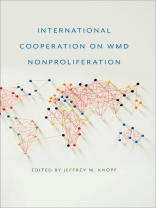International efforts to prevent the spread of weapons of mass destruction (WMD)—including nuclear, biological, and chemical weapons—rest upon foundations provided by global treaties such as the Nuclear Non-Proliferation Treaty (NPT) and the Chemical Weapons Convention (CWC). Over time, however, states have created a number of other mechanisms for organizing international cooperation to promote nonproliferation. Examples range from regional efforts to various worldwide export-control regimes and nuclear security summit meetings initiated by U.S. president Barack Obama. Many of these additional nonproliferation arrangements are less formal and have fewer members than the global treaties.
International Cooperation on WMD Nonproliferation calls attention to the emergence of international cooperation beyond the core global nonproliferation treaties. The contributors examine why these other cooperative nonproliferation mechanisms have emerged, assess their effectiveness, and ask how well the different pieces of the global nonproliferation regime complex fit together. Collectively, the essayists show that states have added new forms of international cooperation to combat WMD proliferation for multiple reasons, including the need to address new problems and the entrepreneurial activities of key state leaders. Despite the complications created by the existence of so many different cooperative arrangements, this collection shows the world is witnessing a process of building cooperation that is leading to greater levels of activity in support of norms against WMD and terrorism.
O autorze
SARA Z. KUTCHESFAHANI is the Director of the N Square DC Hub, and Research Associate at the Center for International & Security Studies at Maryland (CISSM). N Square is a path-breaking initiative built on the idea that new forms of cross-sector collaboration will accelerate the achievement of internationally agreed goals to reduce nuclear dangers. Together with her N Square Responsibilities, she also works at CISSM in both a teaching and research capacity. Most recently, she was a Senior Policy Analyst at the Center for Arms Control And Non-Proliferation, where she led the Fissile Materials Working Group (FMWG), focused on efforts to reduce the risk of nuclear proliferation and terrorism. She was previously the Executive Director for the Center for International Trade and Security and the Director for the Master of International Policy (MIP) Program at the University of Georgia, where she worked on nuclear security-related projects and nuclear non-proliferation policy issues, and taught graduate courses on nuclear non-proliferation history and the global nuclear order. She has held research positions at Los Alamos National Laboratory, the RAND Corporation, the European Union Institute for Security Studies in Paris, and the International Institute for Strategic Studies in London. She holds a Ph D in Political Science from University College, London, and is the author of Global Nuclear Order and Politics and the Bomb: The Role of Experts in the Creation of Creation of Cooperative Nuclear Non-Proliferation Agreements.












